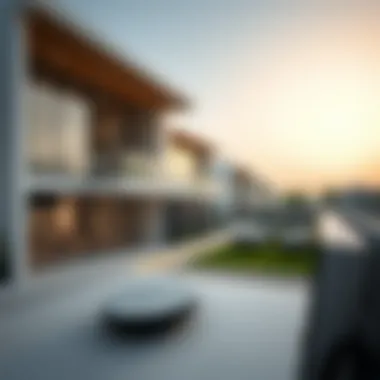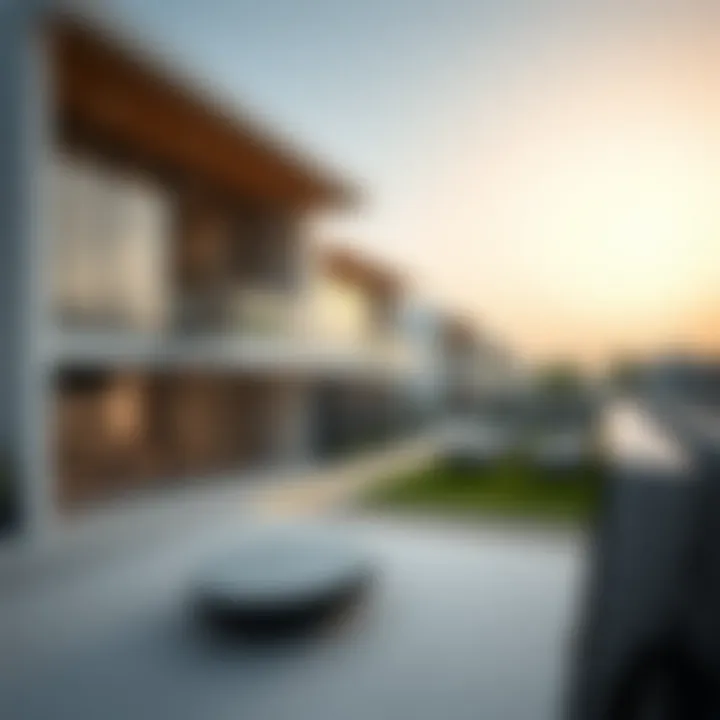Exploring Smart Homes in the UAE: Innovation and Impact


Intro
The concept of smart homes is increasingly gaining traction in the United Arab Emirates, particularly in the bustling landscape of Dubai. As the UAE embraces modernization, the integration of technology in residential properties has transformed how people perceive and utilize their living spaces. This article embarks on a detailed exploration of how smart homes have evolved in the UAE, shedding light on their technological advancements and their significant impact on real estate.
From energy efficiency to home security, smart home systems are increasingly positioned as indispensable aspects of the modern urban lifestyle. Notably, the UAE's unique geographical and cultural context further amplifies the significance of these innovations in daily living. As we delve deeper, we will identify current trends in Dubai's real estate market, providing key insights for investors and homeowners alike.
Our discussion will not only focus on the visible benefits that smart homes offer but also tackle the potential challenges and opportunities within the urban fabric of the UAE. Armed with this knowledge, stakeholders can make informed decisions that align with future trends in this vibrant domain.
Intro to Smart Homes in the UAE
The concept of smart homes has gathered steam in recent years, particularly within the UAE, where lavish lifestyles and cutting-edge technology converge. This discussion on smart homes is not just a fleeting trend; it reflects significant shifts in how we live and interact with our environment. Understanding smart homes in the UAE encompasses a variety of elements that highlight their importance, from enhancing convenience and security to reducing energy consumption. In this increasingly interconnected world, the need to grasp the functions and intricacies of smart home technology is imperative for homebuyers, investors, and property managers alike.
Like a knife through butter, smart home systems introduce seamless control over various devices, enabling households to operate more efficiently. The benefits are bountiful: convenience, improved security, and potential cost savings through energy management. Consider this—automated lighting adjusts based on natural light, and climate control tailors air conditioning to patterns of human behavior. These innovations represent a winning combination of comfort and energy efficiency for home dwellers.
On the flip side, several considerations come into play. Issues such as data privacy and initial installation costs might give some users pause. However, navigating this landscape positively can lead to intelligent living solutions that ultimately save money while protecting the environment.
In the following subsections, we delve deeper into the understanding of smart home technology and the historical context of its development, providing a rounded perspective that should be beneficial to those weighing investment opportunities and functionality.
Understanding Smart Home Technology
Smart home technology encompasses a variety of interconnected devices designed to improve everyday living conditions. Think of smart home systems as the conductor of a sophisticated orchestra, where each device plays its part—from security cameras to energy-efficient appliances. These devices often communicate over the internet, allowing users to monitor and control their homes remotely through smartphones or tablets. This connectivity forms the backbone of what makes a home 'smart.'
Common technology includes smart thermostats, smart lights, and voice-controlled assistants. For instance, consumers utilizing smart thermostats can enjoy increased efficiency, as the devices learn from the everyday behaviors and preferences of the inhabitants. This results in a comfortable environment coupled with potential energy savings that reflect positively on utility bills over time.
Moreover, understanding the types of interfaces available for controlling these technologies plays a crucial role. Some smart home systems offer control through touch screens or voice commands while others may integrate with existing home security systems. As these technologies evolve, the experience of managing a home is changing rapidly, paralleling broader trends in digital transformation.
Historical Context of Smart Homes
Examining the evolution of smart homes in the UAE reveals a fascinating journey from traditional living to the modern technological landscape we see today. In the past, homes were typically designed with basic features, lacking any form of automation. The initial sparks of smart technology ignited in the late 20th century, primarily driven by innovations in home appliances and the advent of the internet.
The turning point for smart homes came in the early 2000s when advancements in wireless technology paved the way for better connectivity. This period saw the birth of home automation systems, allowing users to control lighting, security, and even appliances from a central hub. Over time, manufacturers responded to consumer demand, rolling out sophisticated devices equipped with greater functionality and ease of use.
In the UAE specifically, the rapid urbanization and wealth influx have fueled an appetite for high-tech living. The push toward smart homes aligns well with national goals; initiatives like the UAE Vision 2021 emphasize innovation and technological advancement, aligning perfectly with real estate developments that cater to tech-savvy individuals.
Thus, the historical context of smart homes serves as a backdrop for understanding their current relevance in the UAE, setting the stage for a deeper dive into their key features and ultimate impact on real estate.
Key Features of Smart Homes
Smart homes represent a fusion of technology and everyday living, setting a new standard for comfort and convenience. The significance of key features in smart homes cannot be overstated, particularly in the context of the UAE. These features not only enhance the user experience but also reflect a shift towards a modern lifestyle that prioritizes efficiency, security, and sustainability. As investors and homebuyers examine real estate opportunities, understanding these features becomes essential to appreciate their impact on property value and desirability.
Home Automation Systems
Control Interfaces
Control interfaces are the nerve center of any home automation system, steering the various smart devices within a household. These interfaces offer users an intuitive way to manage their homes through smartphones, tablets, or voice-activated devices. The most significant characteristic of control interfaces is their user-friendliness; they're designed for everyone, from tech enthusiasts to those who favor simpler solutions.
One such popular choice is the centralized app that allows for streamlined control across many devices. Imagine a scenario where you can adjust your lights, thermostat, and home security system all in one dashboard. This functionality is not just a convenience; it promotes efficient energy use and enhances safety, contributing to lower utility bills and peace of mind. However, a disadvantage that comes with these interfaces can be the learning curve—especially for users who may not be as accustomed to technology.
Integration with IoT Devices
Integration with IoT devices is another major selling point in smart home technology. This aspect emphasizes the interconnectedness of various gadgets—from smart refrigerators to thermostats—creating a cohesive ecosystem. A key characteristic that stands out is interoperability; different brand devices can often communicate and work together despite being from separate manufacturers.


One unique feature of this integration is the ability for devices to learn user preferences over time, offering customized experiences that adapt to lifestyles. For instance, a smart thermostat could optimize heating and cooling based on historical usage patterns, leading to significant energy savings. Nonetheless, this feature isn't without challenges. Users must ensure that their devices are compatible and can integrate effectively, or risk losing some of those personalized benefits.
Energy Management Solutions
Smart Thermostats
Smart thermostats serve as a cornerstone in modern energy management solutions within smart homes. They stand out for their ability to automate temperature adjustments based on occupancy and time of day, a feature that significantly reduces energy consumption. This is particularly vital in the UAE, where temperatures soar, and managing energy expenditure is a priority.
The benefit of smart thermostats lies in their efficiency; by learning a household's heating and cooling habits, they can help reduce energy waste. An important characteristic is their remote access, allowing homeowners to make adjustments on-the-go via their smartphones. Despite their advantages, initial costs can be somewhat steep compared to traditional thermostats, which may deter some consumers, but the long-term savings often render them a wise investment.
Energy Monitoring Systems
Energy monitoring systems take the concept of smart homes a step further by providing real-time insights into energy consumption. These systems can pinpoint which appliances are using the most energy, offering crucial data that can help homeowners manage usage proactively. Their key characteristic is granularity; they provide detailed reports and feedback on energy usage patterns.
This clarity allows households to make informed decisions, like switching off high-energy appliances during peak hours to save on electricity bills. Nevertheless, a potential downside is the initial setup and learning process that might be required to interpret the data fully. Users may feel overwhelmed with the amount of information at their fingertips without proper guidance.
Advanced Security Features
Smart Cameras
Smart cameras undoubtedly elevate home security to a new level. They allow homeowners to monitor their premises remotely, offering live feeds and alerts for unusual activities. A standout feature is the ability to access camera feeds from anywhere, providing great flexibility and reassurance.
These cameras can enhance home safety by incorporating facial recognition and alerting homeowners or authorities if unfamiliar faces are detected. That said, privacy concerns could be a stumbling block for many—individuals may be uncomfortable with being monitored, even within their own homes.
Automated Access Control
Automated access control systems bring safety and convenience to the forefront of smart home security features. This system generally utilizes smart locks and keyless entry systems, allowing homeowners to control access to their homes via smartphones or biometric data. A key benefit is the ability to grant or restrict access remotely, which can be particularly useful for monitoring guests or service personnel.
What distinguishes this technology is its ease of use—no more fiddling with traditional keys or worrying about lost ones. However, a consideration here is the reliance on technology. If the power goes out or an internet connection is lost, traditional methods of entry may still be needed, which could lead to potential inconveniences.
Smart homes in the UAE don't just offer comfort; they bring the future of living to today, merging technology with lifestyle for better everyday experiences.
In summation, the key features of smart homes create a foundation for modern living, illuminating pathways towards heightened comfort and efficiency. With this understanding, investors, homebuyers, and property managers can make informed decisions that reflect the growing trend of smart homes in the UAE.
The Role of Smart Homes in Real Estate
Smart homes have shifted gears in the real estate world, becoming indispensable in the contemporary market. As the UAE's urban landscape continues to evolve, the integration of smart technologies in residential properties has transformed the way homes are bought, sold, and valued. Understanding the role that smart homes play in real estate provides valuable insight for investors, homebuyers, and property managers.
Impact on Property Value
The incorporation of smart home features significantly contributes to an increase in property value. Buyers today are not just interested in square footage or the number of bedrooms; they are equally invested in the technological amenities offered by a home. Features such as intelligent energy management systems, automated security measures, and home automation interfaces can elevate a property's appeal.
For instance, a villa equipped with a smart thermostat, smart locks, and a comprehensive security system is likely to attract higher offers compared to properties lacking these technologies. Market studies have shown that homes tailored for modern living with smart features can see an appreciation in value by 10-15%.
Key Considerations:
- Technology Integration: Buyers are looking for homes that seamlessly integrate technology while enhancing comfort, safety and energy efficiency.
- Resale Potential: Providng smart home features can set a home apart in a competitive market.
Attracting Modern Buyers
Today's homebuyers are predominantly tech-savvy millennials and Generation Z individuals who expect advanced amenities in their living spaces. They engage with properties that offer more than just physical comfort; they seek convenience and efficiency.
For example, smart appliances that communicate with other devices can streamline daily tasks, making them a attractive selling point. Additionally, as remote working becomes the norm, homebuyers are favoring properties equipped for a high-speed internet connection and smart home office systems.


The importance of sustainability also cannot be downplayed. Buyers closely align their values with energy-efficient systems that promise lower utility costs and a smaller environmental footprint. The presence of solar panels, smart lighting, and water conservation technologies have shown to resonate strongly with modern buyers.
Developments in Dubai's Real Estate Market
Dubai's skyline is dotted with luxurious residences that embody cutting-edge smart home technologies. Real estate developers are acutely aware of the demands from consumers for smarter living environments. High-profile projects such as The Burj Vista and the Palm Jumeirah residences showcase innovations that attract discerning buyers.
Furthermore, Dubai's regulatory environment supports smart home integration. The UAE government is actively encouraging the adoption of smart technologies as part of their long-term vision. As part of initiatives like the Dubai Smart City Project, there have been significant investments in infrastructure that supports smart living. This includes smart traffic systems, energy management, and safety measures, all of which enhance the desirability of real estate offerings.
“Smart homes are no longer a luxury; they are a necessity in the modern landscape of Dubai.”
To summarize, smart homes are playing a transformative role in the UAE's real estate market. By influencing property values, attracting technologically adept buyers, and steering development trends, smart home technologies are set to redefine urban living in the region.
Consumer Trends in the UAE
Understanding consumer trends in the UAE is crucial, especially given the rise of smart homes and their impact on residential living. The UAE has always been at the forefront of technological advancement in the region, and as more residents seek modern conveniences, the demand for smart home features has skyrocketed. Smart homes not only provide enhanced comfort and security but also promote energy efficiency and sustainability, which is increasingly important for today's discerning buyers.
Market Demand for Smart Features
The market demand for smart features in the UAE, particularly in urban areas like Dubai and Abu Dhabi, continues to grow at a remarkable pace. Home buyers are no longer just looking for properties; they are looking for integrated smart solutions that fit their lifestyle needs. Features like automated lighting systems, smart thermostats, and remote security monitoring are in high demand.
In recent years, various surveys have indicated that homebuyers are prioritizing smart tech within their purchasing decisions. For instance, a study showed that nearly 70% of prospective buyers view smart home features as a strong motivator for their choices. This trend is shaping new constructions, encouraging developers to integrate these technologies as standard rather than optional upgrades.
"In the UAE, the perception of technology is intertwined with luxury. Smart features in homes are becoming more than just accessories—they are a hallmark of modern living."
Influence of Tech-Savvy Generations
As younger generations move into the housing market, their preferences are heavily influenced by their familiarity with technology. Millennials and Generation Z prioritize connectivity and convenience. They are avid users of smart technologies in their daily lives, making them more inclined to seek out homes equipped with the latest gadgets. These generational shifts are compelling real estate developers to rethink their strategies and tailor offerings to meet the expectations of these tech-savvy buyers.
Also noteworthy is the eagerness of these younger demographics to embrace smart home technology for sustainable living. They are more concerned with energy consumption and environmental impact, driving up the request for energy-efficient solutions. Real estate sellers are increasingly aware of these preferences, and many are adjusting their pitches and property offerings accordingly.
Awareness and Education Initiatives
As the technology landscape evolves, so does the necessity for consumer education regarding smart home systems. This has become paramount in the UAE, where various stakeholders—ranging from property managers to tech companies—have initiated programs aimed at enhancing consumer awareness.
Workshops and informational sessions held by local government bodies and industry associations provide potential buyers with insights on the advantages of smart homes. These initiatives cover topics such as the integration of IoT devices, the benefits of energy management systems, and data privacy concerns. Proper education can bridge the gap between hesitation and adoption of smart technologies in residential spaces.
In summary, the underlying trends in consumer behavior in the UAE reflect a strong preference for smart home integrations. As these trends shift, keeping a pulse on them will be invaluable for stakeholders involved in real estate and technology sectors to enhance value and relevance within their offerings.
Challenges of Smart Home Integration
Integrating smart home technology into the existing fabric of residential living in the UAE is not without its hurdles. While the advancements in automation hold great promise, the pathway to fully adopting these innovations is laden with challenges that stakeholders must navigate. Understanding these obstacles is essential, as they can significantly influence investment decisions, consumer adoption rates, and ultimately the future success of smart home technologies in this dynamic market.
Technical Barriers
One of the foremost challenges is technical barriers, which encompass a range of issues from connectivity problems to software compatibility. Many homes in the UAE still rely on traditional wiring, which can impede the seamless integration of new smart devices. The reliance on varied platforms—think Samsung SmartThings versus Apple HomeKit—creates an ecosystem where devices may not communicate effectively with one another.
Furthermore, households may not possess the necessary infrastructure to support robust internet connectivity. In areas where the internet is spotty, reliance on cloud services for smart features can lead to frustrations. It often takes a tech-savvy user to navigate these intricacies, a factor that might deter the average buyer.
"Incompatibility and lack of standardization can leave homeowners feeling like they’ve bought a lemon rather than a state-of-the-art home."
Consumer Privacy Concerns


Another layer of complexity comes from consumer privacy concerns. With each device introduced—be it a smart security camera or a thermostat—there exists a risk of data breaches. Homeowners are understandably wary of how their personal information is collected, stored, and shared. Notably, issues regarding surveillance capabilities raise eyebrows, as many devices require constant data collection to function intelligently.
In a country like the UAE, where privacy regulations are still evolving, the lack of clear guidelines exacerbates fears. Often, potential buyers are left wrestling with the question of whether the convenience offered is worth the risk of intrusive surveillance and data exploitation. Effective legislation and security protocols will be just as critical as technological advancements to overcome these barriers.
High Initial Costs
Lastly, high initial costs represent a significant barrier to entry for many consumers. The investment required for smart home devices can be hefty, with comprehensive systems often running into thousands of dirhams when upgraded components, installation, and ongoing maintenance are factored in. Homebuyers, especially those entering the market, might find it challenging to justify these expenses when weighed against perceived value.
Financial incentives, such as rebates or subsidies for energy-efficient appliances, could support greater adoption. Until then, the perception that smart homes are luxury items remains prevalent. Addressing the costs associated with transitioning to a smart home setup must be a priority for developers and policymakers alike.
To conclude, grappling with these challenges is crucial for anyone involved in the smart home landscape in the UAE. Understanding technical, privacy, and financial hurdles will not only shape consumer experiences but also inform investments and guide future innovations.
Future Prospects of Smart Homes in the UAE
The concept and implementation of smart homes in the UAE are rapidly evolving. As technology continues to advance, the prospects for smart homes look promising. This section focuses on the importance of understanding these future possibilities, particularly the specific elements, benefits, and considerations surrounding smart homes in the UAE.
Advancements in Automation Technology
Automation technology is at the forefront of the smart home revolution. Innovations like voice-activated systems and artificial intelligence algorithms enable homeowners to control every aspect of their living environment with minimal effort. One significant advancement is the integration of machine learning algorithms that can learn from user habits and preferences. This means devices can adjust automatically based on patterns, making life more convenient.
For instance, thermostats like the Nest and the Ecobee adapt over time. They learn when the house is occupied and adjust temperatures accordingly, which not only enhances comfort but also saves energy. The collaboration between devices is another hallmark of this technological leap – with products like Amazon Alexa or Google Home acting as a central hub for various smart devices, homeowners can seamlessly control lighting, heating, and security systems with their voice.
Potential for Sustainable Living
Sustainable living is becoming an increasingly essential consideration as the UAE looks to enhance its environmental initiatives. Smart homes offer numerous opportunities for reducing energy consumption and minimizing carbon footprints. For example, energy management systems can track usage and suggest ways to save energy. Smart lighting solutions that adjust based on the natural light entering a room can also contribute significantly to energy savings.
Moreover, solar panels combined with smart grids create a powerful synergy for sustainable home living. Homes can generate their own energy, reducing reliance on traditional energy sources. The potential for rainwater harvesting systems integrated with smart technology shows promise too, allowing homeowners to utilize resources wisely and efficiently.
"With smart technology, the dream of eco-friendly living is not just a pipe dream; it's becoming a tangible reality for modern homeowners in the UAE."
Role of Government in Smart Home Development
The UAE government plays a crucial role in the development of smart home infrastructure. Initiatives like the UAE Vision 2021 outline the country’s ambition to become a global leader in innovation and technological advancement. The government has introduced regulations and guidelines that promote the adoption of smart home technology among developers and consumers alike.
Incentives like tax rebates, subsidies for smart technology installation, and grants for research in home automation help spur innovation. Public-private partnerships are also essential, where the government collaborates with tech companies to integrate advanced technologies into residential developments.
By fostering a conducive environment for smart living, the government not only paves the way for enhanced living standards but also ensures the transition to sustainable urban environments. The increase in smart home development will drive investment and growth in the real estate market, making a positive impact on the socio-economic landscape.
Epilogue
The exploration of smart homes in the UAE holds significant importance, especially as residents increasingly seek enhanced living experiences through technology. As highlighted in this article, smart home systems offer various benefits that impact not just individual lifestyles but also the broader urban fabric. By embracing automation, energy efficiency, and advanced security, the UAE is steering towards a more sustainable and comfortable future.
Summation of Key Points
In summary, the journey through smart homes reveals several key points:
- Technological Integration: Smart homes are characterized by their ability to integrate with various devices and systems, making daily activities more efficient.
- Market Appeal: There is a growing demand for such features among homebuyers, particularly those from tech-savvy generations.
- Property Value Enhancement: Homes equipped with smart technology not only attract buyers but also tend to command higher property values in the competitive real estate market.
- Challenges: Despite the advantages, barriers exist, including technical difficulties, privacy concerns, and high initial costs that may deter some potential users.
- Future Prospects: As technology continues to evolve, the prospects for smart homes in the UAE look bright, with opportunities for sustainability and innovation.
Final Thoughts on Smart Living in the UAE
To sum it up, smart living in the UAE is more than just a trend; it represents a fundamental shift in how we interact with our homes and environments. The incorporation of technology into everyday living can vastly enhance convenience and security.
However, as the sector grows, the balance between innovation and consumer concerns will be crucial. Investors, homebuyers, and property managers must stay informed about technology advancements and market demands to make well-informed decisions.
As we move forward, perhaps the greatest opportunity lies not only in the technology itself but in how it can contribute to a smarter, more connected community in the UAE.
"The future is already here — it's just not evenly distributed." - William Gibson
For more information on smart homes and the latest innovations, refer to resources from Wikipedia and Britannica.
Remember, staying ahead in the smart home movement means not just adapting to change but also influencing it.















